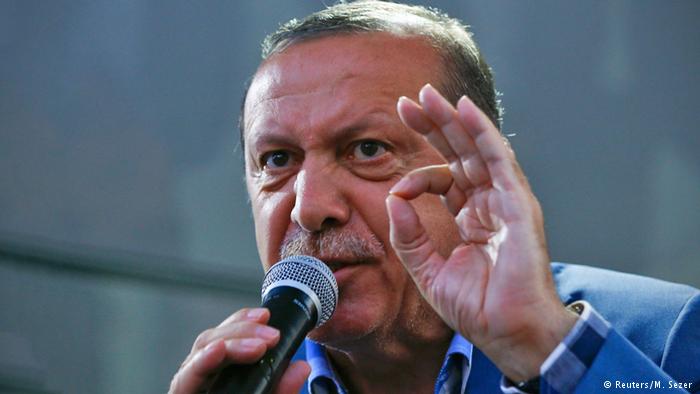Why the West ‘failed to understand’ Turkey

Date posted: January 26, 2017
Ramazan Güveli
The government of Turkey has been repeatedly blasting the West for not understanding Turkey and its actions after the failed coup. It accuses the European Parliament of being naïve for its vote to freeze Turkey’s accession temporarily. According to President Recep Tayyip Erdoğan and his government, there is no doubt that the coup was solely the work of Gülenists, who have infiltrated the army, and they must be cleansed from the state. But what the Turkish government fails to understand is that the West does not see the picture as its painter sees it, and the closure of media outlets and arrest of journalists, academics, opposition politicians and other critical voices are not justified in their eyes.
The ‘coup attempt’ has very conveniently allowed the Turkish regime to accelerate and extend purges, imprisonments, and property confiscation to ever widening sectors of society and dismantle the separation of powers.
A report by the EU intelligence centre Intcen was recently leaked by The Times. The content took few by surprise, but rather endorsed public opinion in Europe regarding the coup. The report concluded that President Erdoğan planned to purge opposition forces in the military before July’s attempted coup and that the coup was mounted by a range of opponents to Erdoğan and his ruling AK Party. This contradicts the Turkish government’s claim that exiled preacher Fethullah Gülen was behind the plot to overthrow the Turkish government.
Related video, added by HizmetNews.Com. Video date: July 18, 2016
Did Erdogan STAGE Failed Military Coup Attempt in Turkey?
President Erdoğan and his government are expending a great deal of effort and money on lobbying in the US and Europe to convince their leaders and public opinion to hold Gülen and his movement responsible for the coup and take punitive action against them. But the anger towards the West from Erdoğan and his pundits shows that, unlike in weaker countries, such as Senegal and Somalia, his ‘holy war’ against the Gülen movement has not been successful.
Six months after the coup, the Turkish government has still not provided any evidence, only propaganda. The Turkish parliament’s committee to investigate the coup attempt has taken witness statements from retired politicians, even the Russian adviser Dugin, but has refused to hear the Chief of Staff of the Turkish Army or the head of Turkey’s intelligence. Instead of the necessary brief evidence or documents to support the accusations against Gülen, Turkey has sent 87 bulky dossiers to the US for Gülen’s extradition, presumably just in case something may hit the target.
“Most Gülen supporters had already been purged from the AKP party lists ahead of the 2011 elections, and countless bureaucrats had seen their promotions frozen in a broad reform of the public administration.” Since it came to power, the AKP government has been profiling Gülen sympathisers and keeping them under control.
Rather than providing evidence which withstands scrutiny, Turkey’s AKP government is paying for Congressmen in DC to write in favour of Gülen’s extradition and publishing advertisements in a Brussels newspaper to defame the Gülen movement by portraying it as a terrorist organisation it calls ‘FETÖ’ (a derogatory term used by the government). Only this week, AKP deputy Şamil Tayyar accused NATO of being a ‘terrorist organisation’ that organises coups d’état in Turkey, so we must now wonder: if an AKP deputy were to pay for an advert depicting NATO in the way the AKP depicts the Gülen movement, would the newspapers in Brussels publish it?
Long before the disputed ‘coup attempt’, Erdoğan’s claim that Gülen movement had established a ‘parallel state’ within the state allowed him to purge the state of non-loyalists en masse. Next, with no evidence of any violent activity whatsoever, and no convictions, his administration claimed that the Gülen movement is a ‘terrorist organisation’, which enabled the government to proscribe the movement, terrorise its grass roots and confiscate all its property and assets. This initial wave of accusations, sackings, and seizure of private property was a power grab needed to deflect accusations of deep corruption and bribery among Erdoğan’s inner circle. The ‘coup attempt’ has very conveniently allowed the regime to accelerate and extend purges, imprisonment, and property confiscation to ever widening sectors of society and dismantle the separation of powers.
Erdoğan is now trying to extend his power beyond Turkey’s borders, using the same propaganda methods abroad, and aims to take over Gülen movement affiliated schools in Africa and Asia, which would help him to extend his influence: his critics portray him as hoping to become the new ‘Sultan’ of the Muslim world.
Simultaneously, pro-Erdoğan campaigns are taking place in the capital of the EU. The deputy prime minister of Turkey wrote in an op-ed: “Consider the extent of the threat. For 40 years, the Gülen network has been working to infiltrate the organs of the Turkish Republic.” A reader who doesn’t follow Turkey at all might be fascinated by such stories and ‘buy’ the narrative of the Turkish government. However, Turkey observers know very well that the AKP government has knowingly appointed, promoted, and then purged people affiliated with the Gülen movement. For example, in 2012 the Centre for European Studies reported, “Most Gülen supporters had already been purged from the AKP party lists ahead of the 2011 elections, and countless bureaucrats had seen their promotions frozen in a broad reform of the public administration.” Since it came to power, the AKP government has been profiling Gülen sympathisers and keeping them under control.
Fethullah Gülen has dedicated his life to teaching a peaceful, spiritual, and dialogic form of Islam, emphasised democracy as the best form of governance and inspired millions to contribute to building a vibrant civil society. His followers founded 800 of the best schools in Turkey; it has naturally resulted that graduates from these schools are disproportionately represented in the public and private sector.
Erdoğan has exploited the presence of Gülen-inspired people in the state bureaucracy as a tool to silence all opposition and grasp yet more power. If the Gülen movement did not exist, the president would have needed to create another “enemy of the state” to fight against in order to reach his ultimate aim.
Ramazan Güveli is Director of Intercultural Dialogue Platform, Brussels.
Source: EurActive.com , January 26, 2017
Tags: Defamation of Hizmet | European Union | Hizmet (Gulen) movement | Military coups in Turkey | Persecution of Hizmet by Erdogan | Turkey |
























